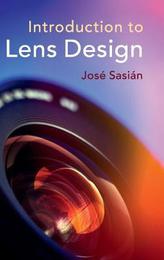
|
Introduction to Lens Design
Hardback
Main Details
| Title |
Introduction to Lens Design
|
| Authors and Contributors |
By (author) Jose Sasian
|
| Physical Properties |
| Format:Hardback | | Pages:248 | | Dimensions(mm): Height 235,Width 156 |
|
| Category/Genre | Applied optics |
|---|
| ISBN/Barcode |
9781108494328
|
| Classifications | Dewey:681.423 |
|---|
| Audience | | Professional & Vocational | | Postgraduate, Research & Scholarly | |
|---|
| Illustrations |
Worked examples or Exercises; 71 Tables, black and white; 171 Line drawings, black and white
|
|
Publishing Details |
| Publisher |
Cambridge University Press
|
| Imprint |
Cambridge University Press
|
| Publication Date |
26 September 2019 |
| Publication Country |
United Kingdom
|
Description
Optical lenses have many important applications, from telescopes and spectacles, to microscopes and lasers. This concise, introductory book provides an overview of the subtle art of lens design. It covers the fundamental, optical theory, and the practical methods and tools employed in lens design, in a succinct and accessible manner. Topics covered include first-order optics, optical aberrations, achromatic doublets, optical relays, lens tolerances, designing with off-the-shelf lenses, miniature lenses, and zoom lenses. Covering all the key concepts of lens design, and providing suggestions for further reading at the end of each chapter, this book is an essential resource for graduate students working in optics and photonics, in addition to engineers and technicians working in the optics and imaging industries.
Author Biography
Jose Sasian is Professor of Optical Design at the College of Optical Sciences at the University of Arizona. He has taught a course on lens design for more than twenty years and has published extensively in the field. He has worked as a consultant in lens design for the optics industry, and has been responsible for the design of a variety of successful and novel lens systems.
Reviews'This book's strength lies in delivering a vast amount of knowledge on optical lens design in a succinct manner. It comprehensively describes the fundamental optical theory and state-of-the-art of lens design, including aberrations, achromatic doublets, and lens tolerances. This field has strong impacts in several technologies from telescopes to lasers to microscopes. The target audience for this text is graduate students in optical design and photonics engineers, but anyone concerned with imaging industries will profit from reading this book.' Christian Brosseau, Optics & Photonics News
|